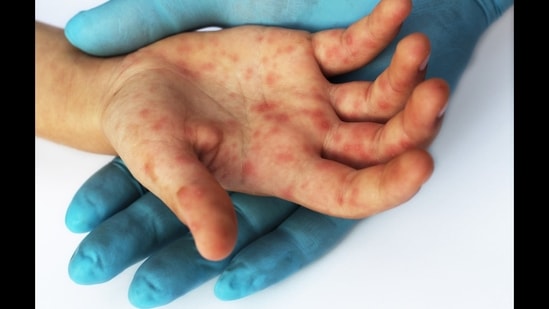Hand, foot and mouth disease: Watch out for these symptoms; dos and don'ts - Hindustan Times
Is your child suffering from hand, foot and mouth disease? Watch out for these warning signs and follow these expert tips.

Hand, foot and mouth disease (HFMD) is in news these days with the rise in number of tomato flu cases in India, which is touted as another variant of HFMD. More common in children under 5, hand, foot and mouth disease is caused by the coxsackie group of viruses and is highly contagious. It can affect older children and adults too. Your kids may develop tongue ulcers, reddish rashes or elevated sores on palms and sores along with sore throat and fever. (Also read: Tomato flu: Know the common symptoms, prevention tips from experts)
"It usually starts with a fever, poor appetite, a vague feeling of being unwell (malaise), and sore throat. One or two days after fever starts, painful sores usually develop in the mouth. They begin as small red spots that blister and that often become ulcers. A skin rash develops over 1-2 days. The rash has flat or raised red spots, sometimes with blisters. The rash is usually on the palms of the hands and soles of the feet; it may also appear on the knees, elbows, buttocks or genital area," says Dr Sidharth Nayyar, Chief Neonatologist, Cloudnine Group of Hospitals, Faridabad.
The viruses can be found in an infected person's nose and throat secretions blister fluid, and feces (stool). An infected person may spread the viruses through close personal contact, the air (through coughing or sneezing), and contact with feces, contaminated objects and surfaces. Risk of a person spreading infection is during the first week of illness. Adults may not develop any symptoms. However, they may still be contagious.
TIPS TO PREVENT INFECTION
It is important to take care of hygiene to prevent spread.
"Proper hygiene includes mandatory hand washing after contact with patient, appropriate cleanliness during diaper changes is imperative. Personal items such as spoons, cups and utensils should not be shared and should be properly washed. Patients with HFMD should be isolated and the usual isolation procedures followed for infection control. Articles such as toys contaminated are disinfected thoroughly," says Dr Sidharth Nayyar.
TREATMENT FOR HFMD
As HFMD is a self-limiting illness, is generally mild, one should not panic if their kids contract it. While there is no specific treatment for hand, foot and mouth disease, some tips can be followed to relieve symptoms.
- A paracetamol for pain and fever can help.
- Mouthwashes or sprays that numb mouth pain can be prescribed for oral ulcers.
- Mild HFMD cases only need symptomatic treatment. Treatment of fever and relief of symptoms, adequate hydration and rest are important.
- Parents and care takers should be educated on hygiene and measures that they should take to prevent transmission to other children.
WHEN SHOULD A CHILD BE HOSPITALISED
• When the child is unable to tolerate oral feeds and there is a need for intravenous hydration.
• When the child is clinically very ill or toxic-looking.
• When some other more serious disease cannot be excluded.
• When there is persistent high-grade fever for more than 48 hours.
• When there is a suspicion of neurological complications, e.g increased lethargy, myoclonus, increased drowsiness, change in sensorium and/or seizures.
• When there is a suspicion of cardiac complications (myocarditis), e.g low blood pressure, low pulse volume, heart rhythm abnormalities, murmurs,gallop rhythm, displaced apex beat
• When parents are unable to cope with child's illness.
• When there is inadequate family or social support in looking after the child at home.
DOs AND DON'TS FOR PARENTS
• Do not panic.
• Isolate at least for a week and do not send to school.
• Monitor the child's fever.
• Ensure proper hydration.
• Avoid oily, spicy foods which will aggravate pain and sores in the throat.
• Give homemade foods.
• Ensure sanitisation of utensils, proper disposal of diapers and proper washing of infected clothes.
• Visit your paediatrician regularly.
Follow more stories on Facebook & Twitter
Personalise your news feed. Follow trending topics
Comments
Post a Comment